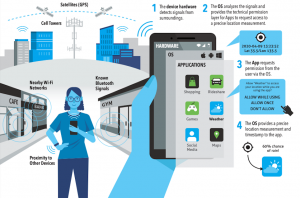Addressing the privacy issues related to advertising technology and online tracking has been a key focus since FPF’s founding. Increasingly, the mobile advertising space, geo-location tracking, and indoor positioning technologies are at the forefront of online data management, retail, and new consumer offerings. Thus, it is not surprising that regulators, industry leaders, and advocates are taking a hard look at questions about how to appropriately collect and handle consumer data for advertising, location-based targeting, and audience measurement. Additionally, as public awareness of targeted and personalized advertising grows, organizations are pushed to deliver more helpful, relevant ads by less intrusive means. FPF curates a gallery of leading practices, provides up-to-date analysis of emerging and evolving technologies, convenes stakeholders in a monthly working group call, and works with policymakers, advocates, and other stakeholders to support leading privacy practices for the use of location data.
Featured
Cross-Device: Understanding the State of State Management
On Friday, October 16, the Future of Privacy Forum filed comments with the FTC in advance of the FTC’s Cross Device Workshop on Nov. 16, 2015. Jules Polonetsky and Stacey Gray have prepared a report, Cross-Device: Understanding the State of State Management, based on revisions to FPF’s comments filed with the FTC on October 16th, that aims to describe […]
Android M and Privacy: Giving Users Control over App Permissions
Android M and Privacy: Giving Users Control over App Permissions Android M promises to deliver several new user-control features built to advance transparency, choice, and predictability. The new App Permissions system allows users to select permissions specific to each app and device feature. The granular system requires apps to request user permissions individually as the […]
FPF Senior Fellow Peter Swire Provide Comments to the FCC on Broadband Consumer Privacy
Later today, Peter Swire, FPF Senior Fellow, will participate at the FCC’s public workshop on broadband consumer privacy. He also prepared written comments expanding on his thoughts. Professor Swire summarizes his research as follows: First, I examine the effect of the Section 222(a) definition of “proprietary information” as compared with the Section 222(c) definition of […]
Future of Privacy Forum Releases Statement on FTC's Settlement with Retail Tracking Company
“Today’s settlement by the Federal Trade Commission with Nomi, a mobile location tracking company, demonstrates the …
Comcast Newsmakers: Jules Talks Consumer Privacy and Location-Based Services
In a recent episode of Comcast Newsmakers, Jules discussed the many new ways that data about your location is being used — such as navigation or helping you connect with friends.
Understanding Beacons: A Guide to Bluetooth Technologies
Local Search Association and Future of Privacy Forum release a simple and concise primer that explains how the Bluetooth devices work and how privacy friendly controls ensure user control.
Barclays Launches Beacons to Help Disabled Customers
Barclays just launched a beacon technology system in a UK branch to help disabled customers with their accessibility needs. The service, which requires customers to download an app and …
Android 5.0, Lollipop: Major New Privacy Features
Earlier this month, Google announced the final release of Android 5.0 Lollipop, also known as Android L. Lollipop includes a number of valuable new privacy features worth special applause. Default Encryption New phones and tablets with Lollipop come with encryption automatically turned on to help protect data on lost or stolen devices or from […]
Beacons Help Blind Travelers Navigate Airport
San Francisco Airport is testing a beacon system to help blind travelers navigate around one of its new terminals. Working with beacon company Indoo.rs, SFO has set up hundreds of beacons all over the …
Do Beacons Track You? No, You Track Beacons
BuzzFeed News today reports that phone booths in NYC are tracking people and can send them ads. Let’s explain this rapidly spreading new technology we often see described inaccurately. First, let’s step back and understand how your phone or apps on your phone that you grant permission to access your location are able to […]










